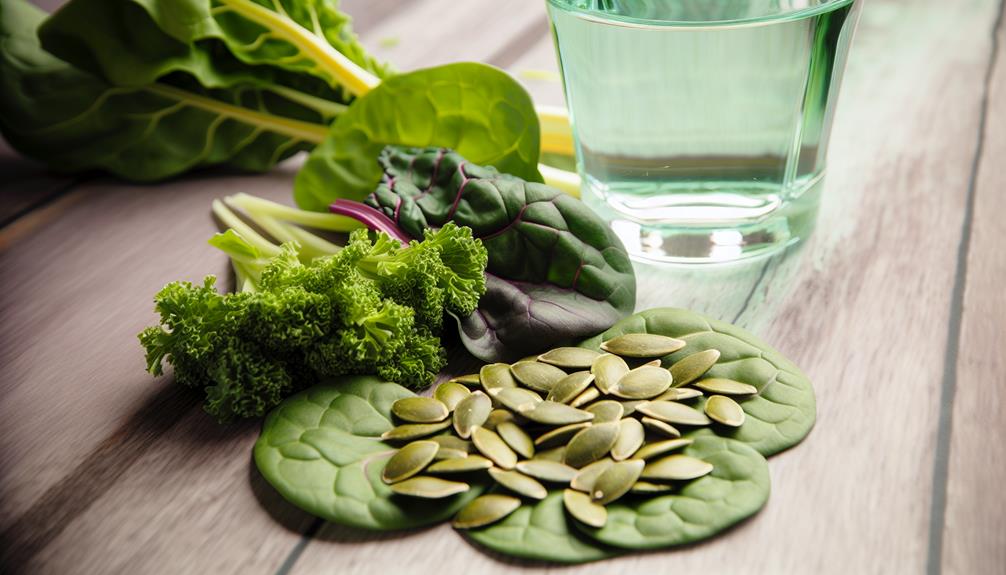If you're looking to enhance your hormonal health, I've found that certain vitamins can make a real difference. Vitamin D is essential for testosterone levels, while the B vitamins, especially B6 and B12, support hormone balance and energy. Antioxidants like Vitamin E and C help protect hormone-producing cells. Don't overlook magnesium for stress management, and omega-3 fatty acids are known to boost testosterone. Folate and Vitamin A are also vital for overall reproductive health. Each of these vitamins plays an important role, and I'll share more details about how they can benefit you.
Vitamin D

When it comes to maintaining ideal hormonal health, I can't overlook the importance of vitamin D. This vitamin, often referred to as the "sunshine vitamin," plays a vital role in regulating testosterone levels, which is essential for overall male hormonal balance. Research shows that vitamin D deficiency can lead to decreased testosterone production, resulting in various health issues, including fatigue and reduced libido.
One of the most effective ways to boost my vitamin D levels is through sunlight exposure. When my skin is exposed to sunlight, it synthesizes vitamin D, providing a natural, efficient source. However, many people, including myself, struggle to get enough sunlight, especially during the winter months or if we live in regions with limited sun. This can lead to vitamin D deficiency, which not only affects hormonal health but can also impact mood and immune function.
I've found that incorporating vitamin D-rich foods into my diet, like fatty fish, egg yolks, and fortified dairy products, can help. However, I often consider supplementation, especially during periods when sunlight exposure is minimal. It's important to consult with a healthcare professional for the appropriate dosage, as too much vitamin D can have adverse effects.
Vitamin B6
When it comes to hormonal health, Vitamin B6 plays an essential role in regulating various hormones in the body. I've found that including foods rich in this vitamin, like chicken, fish, and bananas, can really support overall hormonal balance. Let's explore how Vitamin B6 can benefit your hormonal health and what foods you should consider adding to your diet.
Hormone Regulation Benefits
How can Vitamin B6 play an essential role in hormone regulation? I've discovered that this vitamin is fundamental for maintaining hormone balance and supporting proper endocrine function. It helps synthesize neurotransmitters and hormones, which are critical for various bodily processes, including mood regulation and metabolism. When I guarantee adequate Vitamin B6 intake, I can feel the positive effects on my overall hormonal health.
Here's a quick overview of Vitamin B6's benefits for hormone regulation:
| Benefit | Description | Impact on Hormone Health |
|---|---|---|
| Supports Testosterone | Aids in testosterone production | Promotes muscle growth and libido |
| Regulates Cortisol | Helps manage stress hormones | Reduces anxiety and enhances recovery |
| Balances Estrogen | Contributes to estrogen metabolism | Supports reproductive health |
| Enhances Serotonin | Involved in serotonin synthesis | Improves mood and emotional balance |
| Aids Thyroid Function | Supports thyroid hormone production | Boosts metabolism and energy levels |
Incorporating Vitamin B6 into my routine truly has a profound impact on my hormonal health, and I encourage you to reflect on its benefits as well.
Food Sources Rich
There's no need to search far for delicious food sources rich in Vitamin B6, as many everyday items can help boost your intake. I've found that foods like chicken, turkey, and fish are excellent sources. They're not only versatile but also provide high-quality protein, which is great for overall health.
For those who prefer plant-based options, chickpeas, potatoes, and bananas are fantastic choices too. I often enjoy chickpeas in salads or as hummus, which pairs well with fresh veggies. Speaking of pairings, combining Vitamin B6-rich foods with complex carbohydrates, like whole grains, can enhance absorption and keep you feeling satisfied longer.
Meal timing is another essential factor to take into account. I've noticed that incorporating these foods into my meals consistently throughout the day helps maintain energy levels and supports hormonal balance. For example, having a banana with breakfast or a turkey sandwich for lunch can make a significant difference.
Vitamin B12

Many men may not realize just how important vitamin B12 is for maintaining hormonal health. As a significant nutrient, it plays a noteworthy role in energy production, metabolism, and even mood regulation. A deficiency in B12 can lead to symptoms like fatigue, mood swings, and cognitive decline.
To guarantee I'm getting enough B12, I pay attention to various factors that influence its absorption, such as age, digestive health, and certain medications. If you're considering B12 supplementation, it's wise to follow specific guidelines to avoid excess.
Here's a quick overview of the benefits of vitamin B12:
| Aspect | Importance | Sources |
|---|---|---|
| Energy | Supports energy production in cells | Meat, dairy, eggs |
| Mood | Helps regulate mood and reduce anxiety | Fortified cereals, fish |
| Nerve Health | Important for maintaining nerve function | Poultry, nutritional yeast |
Vitamin B12 also supports cognitive function, which is critical as we age. Studies have shown that adequate B12 levels can improve memory and overall brain health. Additionally, B12 plays a role in heart health by helping to lower homocysteine levels, a marker associated with heart disease.
Incorporating B12-rich foods into my diet guarantees I'm not only supporting my hormonal health but also my overall well-being. Whether through food sources or supplementation, maintaining adequate B12 levels is essential for peak health.
Vitamin E
Regularly incorporating vitamin E into my diet can significantly benefit male hormonal health. This powerful nutrient is renowned for its antioxidant properties, which help protect our cells from oxidative stress. By combating free radicals, vitamin E supports hormonal balance and reduces the aging effects on our body, particularly in men.
One of the important vitamin E benefits is its role in skin health. Healthy skin can improve overall appearance and boost confidence, which can indirectly influence hormonal health. Additionally, vitamin E contributes to heart protection, promoting cardiovascular wellness—a vital factor for hormonal balance as heart health is intimately linked to hormone production.
Alongside these benefits, vitamin E offers immune support by enhancing the function of immune cells. A robust immune system is essential for maintaining ideal hormonal levels, as chronic inflammation can disrupt hormonal balance.
I find it necessary to reflect on natural sources of vitamin E, such as nuts, seeds, and leafy greens, to guarantee I'm getting a well-rounded intake. While supplements can be beneficial, I always prioritize supplement safety and am cautious about dosage, as excessive intake can lead to adverse effects.
It's also important to remember that absorption factors, like dietary fat, can influence how effectively my body utilizes vitamin E. By combining foods rich in this vitamin with healthy fats, I can enhance its absorption and maximize its hormonal health benefits. Incorporating vitamin E into my routine is a simple yet impactful step toward supporting my overall well-being.
Vitamin C

Vitamin C plays a significant role in supporting male hormonal health, and I've found it imperative to include this vitamin in my daily routine. Not only is it well-known for its immune support, but its antioxidant properties also make it a key player in maintaining overall health. Research indicates that adequate levels of Vitamin C can help regulate testosterone levels, which is essential for male hormonal balance.
One of the reasons I prioritize Vitamin C is its ability to combat oxidative stress. Oxidative stress can damage cells, including those responsible for hormone production. By neutralizing free radicals, Vitamin C protects these cells and helps guarantee that hormones are produced efficiently. This is particularly important as we age, as hormone levels can naturally decline, impacting everything from energy levels to mood.
Incorporating Vitamin C into my diet isn't difficult. I enjoy a variety of fruits and vegetables, like oranges, kiwis, and bell peppers, which are packed with this vital nutrient. I've also considered taking a supplement, especially during colder months when my immune system could use a boost.
Zinc
After discussing the importance of Vitamin C, it's clear that supporting male hormonal health requires a multifaceted approach, and one nutrient that stands out is zinc. This mineral plays a significant role in testosterone production and overall hormonal balance. It's fascinating how even a slight zinc deficiency can lead to lowered testosterone levels, which can impact everything from energy levels to mood.
Now, you might be wondering how to guarantee you're getting enough zinc. The good news is that there are plenty of food sources rich in this essential mineral, such as meat, shellfish, legumes, seeds, and nuts. However, if you find it challenging to meet your daily requirements, zinc supplements might be a beneficial option.
Here's a quick overview of zinc and its importance:
| Aspect | Details | Sources |
|---|---|---|
| Role in Hormones | Supports testosterone production | Meat, Shellfish |
| Deficiency Effects | Can lead to low testosterone levels and fatigue | Legumes, Nuts |
| Supplementation | Effective for those with dietary insufficiency | Zinc supplements |
Research indicates that supplementing with zinc can help restore hormonal balance, especially in those who are deficient. Just remember to consult with a healthcare professional before starting any new supplement regimen. By being mindful of your zinc intake, you're taking a proactive step toward enhancing your hormonal health.
Magnesium

When it comes to male hormonal health, magnesium plays an essential role in testosterone production. I've found that maintaining adequate magnesium levels can also help with stress management, which is imperative since stress can negatively impact hormone balance. Let's explore how this essential mineral supports our hormonal well-being.
Role in Testosterone Production
Many people might not realize how essential magnesium is for testosterone production. This mineral plays a significant role in testosterone synthesis, markedly impacting men's hormonal health. Research shows that magnesium deficiency can lead to lower testosterone levels, which may result in various health issues, including decreased libido and muscle mass.
I've found that maintaining adequate magnesium levels is crucial for achieving hormonal balance. A balanced hormonal environment is necessary for overall well-being, and magnesium helps regulate the endocrine system, which includes hormone production and release. Studies indicate that individuals with higher magnesium intake often exhibit better testosterone levels, making it a key player in male hormonal health.
Incorporating magnesium-rich foods into my diet—like leafy greens, nuts, and whole grains—has been beneficial. Additionally, supplements can be helpful, but I always recommend consulting a healthcare professional before starting any new regimen.
Ultimately, ensuring you get enough magnesium could support not only testosterone production but also overall hormonal balance, promoting a healthier lifestyle. By recognizing the importance of magnesium, I feel empowered to take charge of my hormonal health and well-being.
Benefits for Stress Management
In recent years, I've come to appreciate the essential role magnesium plays in stress management. This mineral is often overlooked, yet it greatly impacts our ability to cope with stress. Research indicates that adequate magnesium levels can help regulate cortisol, the hormone responsible for our stress response. Here are three benefits I've noticed:
- Better Sleep Quality: Magnesium helps relax muscles and calm the mind, which can lead to improved sleep. Quality sleep is fundamental for effective stress reduction techniques.
- Reduced Anxiety: Studies show magnesium can help lower anxiety levels. When I make sure I'm getting enough magnesium, I feel more grounded and less overwhelmed.
- Balanced Mood: This mineral promotes the production of neurotransmitters like serotonin, which contribute to a positive mood. I've found that maintaining balanced cortisol levels through magnesium intake enhances my overall emotional well-being.
Incorporating magnesium-rich foods, like leafy greens and nuts, into my diet has been a game changer. By prioritizing this essential nutrient, I feel more equipped to handle daily stressors, making it a key component of my overall hormonal health strategy.
Omega-3 Fatty Acids
Incorporating omega-3 fatty acids into my diet has been a game-changer for my overall hormonal health. I've learned that these essential fats play a significant role in the production and regulation of hormones, which is critical for maintaining balance in my body. Omega-3 benefits go beyond just hormonal health; they also support heart health, reduce inflammation, and enhance brain function.
To get my daily dose, I focus on various omega-3 sources. Fatty fish like salmon, mackerel, and sardines are some of the best options. I've also found that flaxseeds, chia seeds, and walnuts are excellent plant-based sources for those who prefer not to eat fish. Incorporating these foods into my meals has been simple and effective. For instance, I often add flaxseed to my smoothies or toss walnuts into my salads.
Research supports the positive impact of omega-3s on testosterone levels and overall male reproductive health. A study I came across highlighted that men with higher omega-3 intake had better hormone profiles compared to those with lower levels. This has motivated me to keep these fatty acids a regular part of my diet.
Folic Acid

After exploring the benefits of omega-3 fatty acids, it's worth noting how folic acid also plays an important role in male hormonal health. Folic acid, or vitamin B9, is essential for DNA synthesis and repair, which can greatly influence hormonal balance in men. I've come across several key folic acid benefits that highlight its significance:
- Improved Sperm Quality: Research indicates that adequate folic acid levels can enhance sperm count and motility, which are critical for fertility.
- Hormonal Regulation: Folic acid helps in the production of neurotransmitters that affect mood and stress, indirectly influencing testosterone levels and overall hormonal balance.
- Heart Health: Healthy testosterone levels are linked to cardiovascular health, and folic acid can help reduce homocysteine levels, promoting better heart function.
When it comes to folic acid sources, I've found a variety of options that are both delicious and nutritious. You can incorporate foods like leafy greens (spinach, kale), legumes (lentils, chickpeas), and fortified cereals into your diet. Additionally, avocados and citrus fruits also pack a good dose of folate, the natural form of folic acid.
Incorporating these foods can help guarantee you're getting adequate folic acid, which, as I've learned, is critical for maintaining hormonal health. So, don't underestimate the power of this vitamin; it's an essential part of your nutritional arsenal for peak male health.
Vitamin A
While you might associate vitamin A primarily with eye health, it also plays an essential role in male hormonal health. I've learned that this nutrient is important for the production and regulation of hormones like testosterone. Adequate levels of vitamin A can support reproductive health and help maintain libido, which is something many men overlook.
One of the standout vitamin A benefits is its influence on the endocrine system, which controls hormone release. A deficiency in vitamin A can lead to hormonal imbalances, potentially impacting everything from mood to energy levels. In my experience, ensuring I get enough vitamin A has made a noticeable difference in my overall well-being.
When it comes to Vitamin A sources, I've found that there are two main types: preformed vitamin A (retinol) and provitamin A carotenoids. Animal-based foods like liver, fish oils, and dairy products are rich in retinol. On the other hand, plant-based foods like carrots, sweet potatoes, and spinach provide carotenoids, which the body can convert into active vitamin A.
Incorporating a mix of these foods into my diet has been an effective strategy for me. Not only do they contribute to hormonal health, but they also offer a range of other nutritional benefits. Remember, balancing your vitamin A intake can empower your hormonal health, leading to improved health and overall well-being.
Frequently Asked Questions
How Do Lifestyle Factors Affect Vitamin Absorption in Men?
I've found that lifestyle factors like dietary habits and exercise routines play a significant role in vitamin absorption. For instance, a balanced diet rich in healthy fats can enhance the absorption of fat-soluble vitamins. On the other hand, excessive alcohol or processed foods can hinder it. Regular exercise also improves overall digestion and metabolism, making nutrient absorption more efficient. So, being mindful of these factors can really boost how well our bodies utilize vitamins.
Can I Get Enough Vitamins From Diet Alone?
I often wonder if I can get enough vitamins from my diet alone. While it's possible to meet most of my needs through dietary sources, vitamin bioavailability plays an essential role. Some foods offer vitamins in forms my body absorbs better than others. However, factors like cooking methods and food pairings can affect this absorption. So, I try to eat a varied diet, but sometimes I consider supplements to fill any gaps.
Are There Any Risks of Vitamin Overdoses for Men?
Isn't it funny how we often overlook the simple things, like vitamins? While they're essential, it's vital to know the risks of vitamin overdoses for men. Vitamin toxicity can lead to serious issues, including nausea, fatigue, or even nerve damage. I've learned that balance is key; sticking to recommended doses helps avoid overdose symptoms. It's always best to consult with a healthcare provider before taking supplements, just to be safe!
How Do Age and Hormonal Changes Impact Vitamin Needs?
As I've learned, age and hormonal changes greatly impact our vitamin needs. With age, we often face age-related deficiencies that can disrupt hormonal balance. For instance, testosterone levels may decline, affecting our overall health. This shift means we might need more specific vitamins to support our hormonal functions, like Vitamin D and B12. Staying informed about these changes helps guarantee we meet our body's evolving requirements and maintain ideal health.
Should I Take Supplements or Focus on Whole Foods?
Choosing between supplements and whole foods can feel like standing at a crossroads, each path whispering promises of health. I've found that focusing on food sources often provides a richer tapestry of nutrients than supplement types alone. Whole foods offer vitamins, minerals, and fiber that work in harmony, while supplements can fill gaps when needed. I believe balancing both can be wise, but I prioritize getting nutrients from real, nourishing foods whenever possible.
